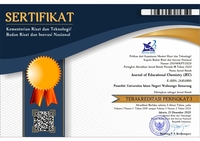A Study on The Reality of e-Learning for Chemistry Students During The COVID-19 Pandemic
DOI:
https://doi.org/10.21580/jec.2023.5.1.15002Keywords:
chemistry, education, e-learning, online learningAbstract
In a survey conducted by the Department of Chemistry on the reality of e-learning, which became widespread in most international universities during the COVID-19 pandemic in 2020, up to 50 students participated to express their thoughts and confirm observations. This survey was crucial in determining the importance of e-learning for the continuity of education and its potential drawbacks. The students’ opinions were collected using specific questions designed for a questionnaire. The survey's key findings can be summarized as follows: Both students and teaching staff played pivotal roles in the success of e-learning. Additionally, the availability of logistical tools and infrastructure that facilitated communication between students and lecturers proved vital to the effectiveness of online learning.
Downloads
References
Anokhin, E. O., Aleshin, G. Y., Tishkin, A. A., Korolev, V. V., Sobol, A. G., Evdokimov, K. M. & Chepiga, A. A. 2021. Not Great, Not Terrible: Distance Learning of Chemistry in Russian Secondary Schools During COVID-19. Chemistry Teacher International, 3(4): 349–357
Bawa’Aneh, M.S. 2021. Distance Learning During COVID-19 Pandemic in UAE Public Schools: Student Satisfaction, Attitudes and Challenges. Contemp. Educ. Technol. 13, 1–13.
Berg, A. G. & Simonson, M. 2023. Distance Learning. Encyclopedia Britannica. Retrieved March 27, 2023 from https://www.britannica.com/topic/distance-learning
Bozkurt, A., Jung, I., Xiao, J., Vladimirschi, V., Schuwer, R., Egorov, G., Lambert, S., Al-Freih, M., Pete, J., Olcott Jr, D. & Rodes, V., 2020. A global Outlook to The Interruption of Education Due to COVID-19 Pandemic: Navigating in a Time of Uncertainty and Crisis. Asian Journal of Distance Education, 15(1), 1-126.
Chen, K., Chen, Y., Ling, Y. & Lin, J.. 2020. The Individual Experience of Online Chemistry Teacher Education in China: Coping with COVID-19 Pandemic. Journal of Chemical Education, 97(9), 3265-3270.
Chi, M.T.H. & Wylie, R. 2014. The ICAP Framework: Linking Cognitive Engagement to Active Learning Outcomes. Educ. Psychol. 49, 219–243.
Ellis, R.A., Hughes, J., Weyers, M., & Riding, P. 2009. University Teacher Approaches to Design, Teaching, and Concepts of Learning Technologies. Teach. Teach. Educ. 25, 109–117
Hofstein, A. & Mamlok-Naaman, R., 2017. The Laboratory in Science Education: The State of The Art. Chemistry Education Research and Practice, 8(2), 105-107.
Hofstein, A., 2014. The Laboratory in Chemistry Education: Thirty Years of Experience with Developments, Implementation, and Research. Chemistry Education Research and Practice, 5(3), 247-264.
Khalid, S., Ibraheem, A., Al-Furaiji A., 2021. Chemical Safety Awareness for Undergraduate Analytical Chemistry Students: A Case Study at Baghdad University, Republic of Iraq. J. Humanities Soc Sci, 4(4), 30-35.
Motaghian, H., Hassanzadeh, A., & Moghadam, D.K. 2013. Factors Affecting University Instructors’ Adoption of Web-Based Learning Systems: Case Study of Iran. Comput. Educ. 61, 158–167.
Nahid A. 2020. Evaluating Challenges of Teaching and Learning Chemistry Online During Covid-19 Pandemic in the Academic Year 2020-2021. Research in Chemistry Education, 3(4), 109-137.
Sari, I., Sinaga, P. & Hernani, S. 2020. Chemistry Learning Via Distance Learning During The COVID-19 Pandemic. Tadris J. Educ. Teach. Train. 2020, 5, 155–165.
Saroff, L. 2019. Creative and Innovative Online Teaching Strategies: Facilitation for Active Participation. J. Educ. Online. 16, 1–9
Yulia, H., 2020. Online Learning to Prevent the Spread of Pandemic Corona Virus in Indonesia. English Teaching Journal, 11(1), 48-56.
Downloads
Published
How to Cite
Issue
Section
License
The copyright of the received article shall be assigned to the journal as the publisher of the journal. The intended copyright includes the right to publish the article in various forms (including reprints). The journal maintains the publishing rights to the published articles.
Authors are permitted to disseminate published articles by sharing the link/DOI of the article at the journal. Authors are allowed to use their articles for any legal purposes deemed necessary without written permission from the journal with an acknowledgment of initial publication to this journal.

This work is licensed under a Creative Commons Attribution-NonCommercial-ShareAlike 4.0 International License.


